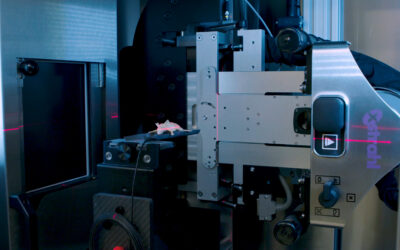Background & Aims
The role of radiation therapy in the treatment of patients with pancreatic ductal adenocarcinoma (PDA) is controversial. Randomized controlled trials investigating the efficacy of radiation therapy in patients with locally advanced unresectable PDA have reported mixed results, with effects ranging from modest benefit to worse outcomes compared with control therapies. We investigated whether radiation causes inflammatory cells to acquire an immune-suppressive phenotype that limits the therapeutic effects of radiation on invasive PDAs and accelerates progression of preinvasive foci.
Methods
We investigated the effects of radiation therapy in p48Cre;LSL-KrasG12D (KC) and p48Cre;LSLKrasG12D;LSL-Trp53R172H (KPC) mice, as well as in C57BL/6 mice with orthotopic tumors grown from FC1242 cells derived from KPC mice. Some mice were given neutralizing antibodies against macrophage colony-stimulating factor 1 (CSF1 or MCSF) or F4/80. Pancreata were exposed to doses of radiation ranging from 2 to 12 Gy and analyzed by flow cytometry.
Results
Pancreata of KC mice exposed to radiation had a higher frequency of advanced pancreatic intraepithelial lesions and more foci of invasive cancer than pancreata of unexposed mice (controls); radiation reduced survival time by more than 6 months. A greater proportion of macrophages from radiation treated invasive and preinvasive pancreatic tumors had an immune-suppressive, M2-like phenotype compared with control mice. Pancreata from mice exposed to radiation had fewer CD8+ T cells than controls, and greater numbers of CD4+ T cells of T-helper 2 and T-regulatory cell phenotypes. Adoptive transfer of T cells from irradiated PDA to tumors of control mice accelerated tumor growth. Radiation induced production of MCSF by PDA cells. A neutralizing antibody against MCSF prevented radiation from altering the phenotype of macrophages in tumors, increasing the anti-tumor T-cell response and slowing tumor growth.
Conclusions
Radiation treatment causes macrophages murine PDA to acquire an immune-suppressive phenotype and disabled T-cell–mediated anti-tumor responses. MCSF blockade negates this effect, allowing radiation to have increased efficacy in slowing tumor growth.
Lena Seifert, Gregor Werba, Shaun Tiwari, Nancy Ngoc Giao Ly, Susanna Nguy, Sara Alothman, Dalia Alqunaibit, Antonina Avanzi, Donnele Daley, Rocky Barilla, Daniel Tippens, Alejandro Torres-Hernandez, Mautin Hundeyin, Vishnu R. Mani, Cristina Hajdu, Ilenia Pellicciotta, Philmo Oh, Kevin Du, George Miller







